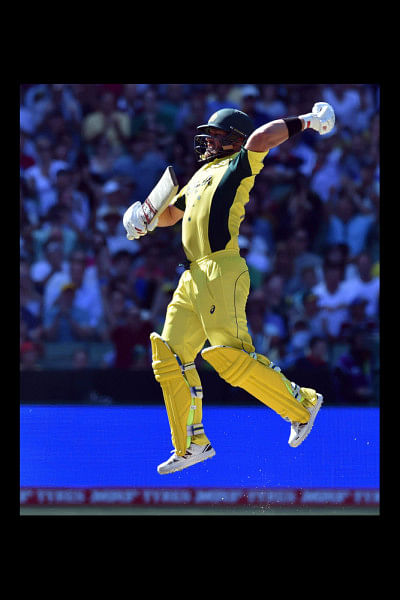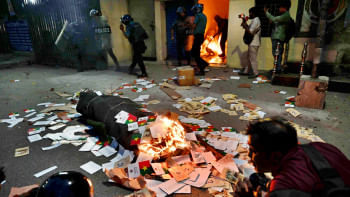Then & now

The Great Southern Stand was newly inaugurated when the last World Cup game was played at the MCG, and in Australia. That was the 1992 final. Also fresh-faced then were Aaron Finch and Glenn Maxwell, who hadn't started school, and Mitch Marsh, who hadn't started to walk. On Saturday, they were the stars as the World Cup returned to the MCG. The southern stand, then the MCG's newest, now the oldest, was heaving again. But one element was unchanged; then, as now, the fall guys were England, bowing to Pakistan then, Australia now.
Finch raised the curtain with a century made with strokeplay as compact and stylish as Sachin Tendulkar's. Maxwell rang it down with a brutalist display of hitting. England's consolation prize was Steve Finn's bizarre hattrick, obtained from the last three balls of Australia's innings. As he and England soon found, this prize was not redeemable for cash or points. Marsh, pitching the ball up, inviting the hoick and taking five wickets, made sure of that. A man protesting against the detention of asylum seekers darted past Australian fielders.
In 1992, there were only two 300-plus scores for the tournament and Pakistan's 6/249 was enough to stave off England in the final. This time, there were two 300-plus on day one; Australia's at the MCG and New Zealand's in Christchurch. England's reply in Melbourne and Sri Lanka's in Christchurch would have won them three-quarters of the 1992 group games. This day, they were losing scores by humiliating margins. Henceforth, 300 is the new 200. In 1992, the Moneyball play was a single. In the final, Pakistan hit a total of 18 fours, and England 11. On Saturday, at the same ground, Maxwell slathered 11 fours by himself, in fewer than 40 balls. Before him, Finch had creamed 12 fours and hoisted three sixes. Half of Australia's runs came from boundaries, this on the biggest ground in the country, each prompting kitsch puffs of flames from behind the sight screens.
Boundary, though, is an advised term. In 1992, the boundary was the fence. Then came a rope, and for this tournament, a second enclosing ring of hoardings. The effect is akin to barbed wire fortification of trenches in a distant battlefield. Modern batsmen are obliged only to reach or clear the first line. There were 66 instances this day.
Australia crashed 50 from the first six overs, 76 from the last six. Though there were lulls, the next spurt was never far away. When Australia began to maraud, England seemed lost for ideas to stop them. In such a profligate environment, fielding matters. On Saturday, England hardly took a chance until it didn't matter anymore. Australia didn't miss one until it didn't matter. At short cover, Steve Smith caught a ball he could hardly have seen.
If there was a downside, it was that after Australia had raised 9/342, all that followed was academic. James Taylor's marvellously impudent 98 not out counted for as much as Eoin Morgan's latest duck, the catch Smith took mattered as little as the one Finch dropped, and Marsh will have days when one wicket is as telling as his five this day. But as far as the crowd of nearly 85,000 cared, tell that to the judge.
-- Compiled

 For all latest news, follow The Daily Star's Google News channel.
For all latest news, follow The Daily Star's Google News channel. 



Comments